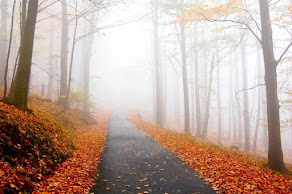We held several Zoom meetings with family and friends over the Thanksgiving holiday. We talked about children and grandchildren and other usual things, but of course the topic of Covid came up. One thing that struck me was how the disease has affected different people in different ways -- and how our attitudes vary depending on our situation. I see three or four different faces of Covid.
Those of us who are retired talked mostly about how we are isolating, and not traveling, and not able to see our grandchildren in person. We fear the disease and avoid other people. We are bored and sometimes lonely, and sometimes frustrated by the restrictions on our lives. Most of us know someone who has been in the hospital with the disease. We know one or two who have died -- usually someone's elderly relative in a nursing home.
What we don't worry about is our finances. We have no job to lose. Our salaries just show up in our bank accounts -- automatically from Social Security or a pension or an IRA withdrawal.Then there's our children. Most of them are still working. A couple work exclusively from home -- and for at least one of them it's been a blessing. He has a one-year-old at home that he now gets to see -- and a long commute to work that he doesn't have to make.
Others have had to figure out how to work from home, when they can, but still at times go into a workplace with other people. My daughter has been tested for Covid four separate times, because someone in her building tested positive. So far she's been negative. But Covid is running rampant where she works. She's a healthy young adult, but still a little nervous about the whole thing.
We have a couple of grandchildren who are going to school. A third-grader is taking part in the hybrid approach. He spends a lot of time doing lessons on Zoom. He declined to attend our family Zoom meeting. He's had enough.
One grandchild is going to preschool five days a week -- so far, so good. It turns out for some reason schools are not the super-spreaders that we might expect. But another one of our grandchildren is being homeschooled this year -- because her mother isn't taking any chances. Different people, different solutions.
We have one child, in his mid-30s, who has yet another attitude. He is angry. He was 15 years into his career and doing well ... until the spring of 2020. He's in the entertainment business. His company has lost virtually all of its revenue. It kept him on full salary until July, then on half salary until just last week. But now the company is shutting down. He's getting paid and keeping his benefits until the end of the year. Then he's on his own.
As you might expect, he takes a different view of the pandemic. He's young and healthy. He's not afraid of Covid. He's afraid of running out of money and losing his medical insurance. His career has been torpedoed -- and he has no idea what the future holds for him. Will a vaccine allow people to congregate again and save the theaters, the movies, the music venues, the restaurants and travel industry? Maybe. But who knows how this will change people's habits and expectations? Who knows what the world will look like after this is all over -- assuming it's ever all over?
Covid is unpredictable. Some people get it and don't even know they have it. Others feel the dreaded cough, the headache, and a few days later they're in the ICU. The fear of the disease is only a minor inconvenience for some. For others it kills their careers, turns their world upside down.
No doubt, Covid has affected us all -- all in different ways. What we share is hope. The hope of better treatments. The hope of an effective vaccine. And the hope that by this time next year it will be but a distant memory.






